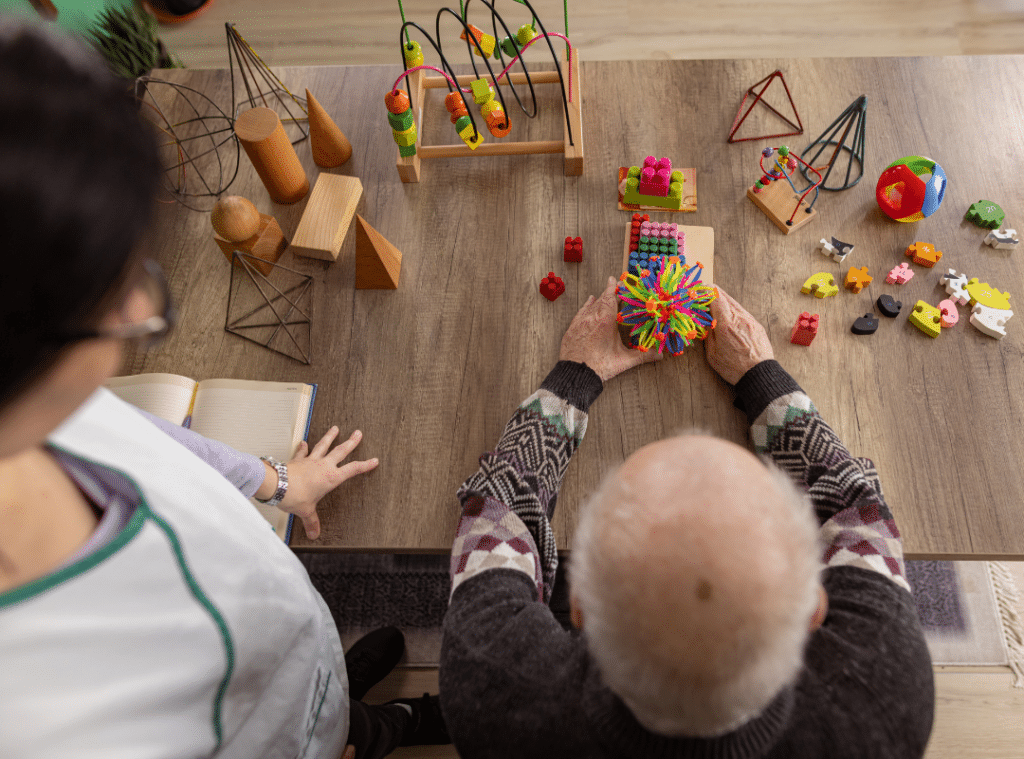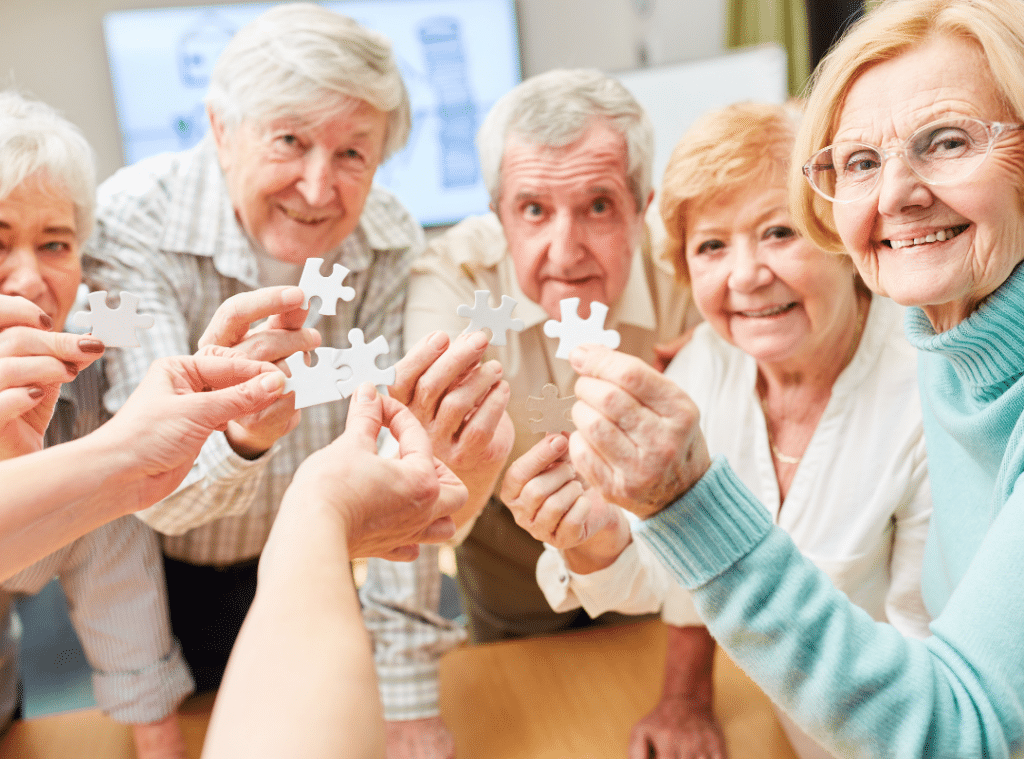Best Activities for Dementia Seniors to Enjoy Daily
Engaging activities for dementia seniors can significantly enhance their well-being, offer a sense of structure, and improve connections with loved ones. At Westmont of La Mesa, we understand how important it is to create positive, enriching experiences for seniors at every stage of dementia.
Whether it’s through personalized games for seniors with dementia, crafting, or sensory-focused activities, choosing meaningful options ensures emotional support and cognitive engagement. These fun activities for seniors go beyond entertainment; they help maintain dignity, foster joy, and deepen bonds with family and caregivers.
Why Engagement Matters in Dementia Care
Keeping seniors with dementia engaged supports their emotional and mental health. Purposeful activities for dementia seniors improve communication skills, reduce agitation, and spark moments of happiness. These activities also reduce feelings of isolation and help seniors connect with caregivers and peers. Implementing individualized engagement strategies, like those found here, builds confidence and helps maintain identity and routine.
Incorporating familiar tasks and favorite pastimes can evoke positive emotions and memories. With patience and creativity, caregivers can offer therapeutic moments that leave lasting impressions on seniors and their loved ones.
Matching Activities to Dementia Stages
Every stage of dementia calls for specific engagement strategies. Adapting activities for dementia seniors ensures each person participates comfortably and meaningfully.
- Early-stage dementia: Try crossword puzzles, light board games, or storytelling prompts.
- Middle-stage dementia: Break tasks into steps; consider arts and crafts, sorting items, or simple games for dementia patients.
- Late-stage dementia: Opt for sensory experiences like music, hand massages, or soft-textured materials.
Involving family in these moments enhances emotional support, strengthens bonds, and promotes well-being.
Cognitive Boosts Through Play
Playing games provides mental stimulation and creates joy-filled moments. Well-chosen games for seniors with dementia entertain and preserve brain function and memory.
Card games like Uno, memory-matching, or word scrambles are enjoyable and adaptable. Jigsaw puzzles with large pieces help with hand-eye coordination and visual processing. Use reminiscence-based games to encourage storytelling, laughter, and sharing.
These fun activities for seniors can be made more impactful by customizing them to your loved one’s history and interests. Learn more about memory games that work and integrate them into your daily routine for joyful, meaningful interaction.
Crafting for Connection and Creativity
Creative expression is a vital tool in memory care. Activities for dementia seniors involving arts and crafts stimulate imagination and provide a sense of purpose.
- Photo Albums: Reviewing photos together encourages storytelling and emotional expression.
- Scrapbooks: Build themed pages such as holidays, family trees, or favorite vacations.
- Painting and Coloring: These therapeutic activities promote relaxation and spark conversation.
Crafting provides structure and allows seniors to leave behind a tangible product, which can be proudly displayed or gifted. According to art therapy research, this form of expression reduces anxiety and strengthens communication.

Sensory Stimulation in Dementia Care
For those in moderate to late stages, sensory-based activities for dementia seniors are especially beneficial. These experiences tap into the senses and foster soothing, joyful connections.
| Activity | Benefit | Best For |
| Scarf Dancing | Enhances coordination and mood | All mobility levels |
| Balloon Batting | Promotes laughter and physical activity | All mobility levels |
| Tai Chi Movements | Boosts calmness and balance | Limited mobility |
| Singing Groups | Stimulates memory and language | All stages of dementia |
Additionally, sensory therapies like essential oils, soft blankets, and nature sounds can offer comfort and a feeling of safety. You can also explore external ideas like Music & Memory, a program that uses personalized playlists to engage seniors emotionally.
Simple Games for Dementia Patients
Keeping it simple ensures a frustration-free experience. Simple games for dementia patients help reduce anxiety while encouraging interaction.
Examples include:
- Dominoes with large dots
- Bingo with visual cues
- Sorting games with colored blocks
These low-stress activities are ideal when attention span and motor skills may be limited. Games for seniors with dementia should always be adjusted based on mood, energy, and preferences.
Providing options, not mandates, encourages autonomy and dignity. You might also try therapy dolls and fidget boards for more advanced stages, which offer soothing tactile engagement.
Therapeutic Activities to Soothe and Stimulate
Therapeutic activities are designed to reduce agitation, promote relaxation, and improve mood. Music therapy, guided breathing, aromatherapy, and pet therapy are all examples.
Listening to favorite songs, participating in chair yoga, or cuddling a soft pet companion can bring peace and happiness. These activities for dementia seniors don’t just entertain—they heal.
Consider:
- Creating a calming corner with familiar objects
- Practicing deep-breathing exercises together
- Giving light hand massages using lavender oil
These therapeutic activities benefit patients by lowering blood pressure, improving sleep, and increasing verbal expression. Many caregivers also find that shared therapy-based routines reduce their own stress levels.
Fun Activities That Bring Joy
Joy is medicine for the heart. Focusing on fun activities for seniors is just as essential as focusing on cognitive or physical exercises.
These uplifting activities could include:
- Themed dress-up days
- Gardening with raised beds
- Watching classic comedies
- Ice cream socials
Whether indoors or outside, it’s important to create happy moments. Integrating activities for dementia seniors that align with their interests ensures these joyful opportunities are frequent and fulfilling.
You might find that something as simple as a walk through a flower garden or listening to a familiar jazz tune becomes the highlight of the day for your loved one.
Enriching the Experience at Westmont of La Mesa
At Westmont of La Mesa, we believe every moment matters. Our team is trained to recognize what types of therapeutic activities, games for seniors with dementia, and sensory engagements are best suited to each resident’s needs.
We blend structure with creativity, offering personalized programs that promote emotional, cognitive, and physical well-being. From group sing-alongs to one-on-one memory walks, we tailor every experience to nurture dignity and connection.
Our approach is rooted in respect, compassion, and the belief that joy and purpose never fade. Learn more about our philosophy and offerings here.
Discover the Joy of Shared Moments
Every day offers a chance to create meaningful experiences for your loved one. With the right activities for dementia seniors, you can transform routine into ritual and ordinary time into cherished memories.
By introducing a mix of simple games for dementia patients, fun activities for seniors, and soothing therapeutic activities, you can offer both emotional support and joyful connection.
At Westmont of La Mesa, we’re here to guide you on this path. For more information, call 619-369-9700 or schedule a visit at this link.
Dive into the vibrant life our Westmont communities have to offer.Find Where You Belong
Frequently Asked Questions
What are fun activities for elderly people with dementia?
Fun activities for elderly individuals with dementia should be simple, engaging, and tailored to their abilities. Examples include listening to music, gardening, painting, folding laundry, or doing puzzles. These activities stimulate the brain while providing comfort through familiar routines. Always prioritize safety and adjust tasks based on the person’s current cognitive level.
What can you do for someone with dementia?
Providing support to someone with dementia involves patience, empathy, and consistency. You can help by creating a structured daily routine, clear communication, and offering task reminders. Encouraging involvement in enjoyable, low-stress activities also helps maintain their sense of purpose. Most importantly, ensure a safe, calm environment that reduces confusion and frustration.
What are passive activities for dementia patients?
Passive activities are those that don’t require active participation but still offer sensory or emotional stimulation. Examples include listening to calming music, watching nature videos, flipping through photo albums, or enjoying gentle hand massages. These activities can be soothing and help reduce anxiety or restlessness. They’re ideal during later stages of dementia when active engagement becomes more difficult.
How to help the elderly with dementia?
To help an elderly person with dementia, focus on maintaining their dignity and independence as much as possible. Use simple instructions, label items around the house, and keep a consistent routine to minimize confusion. Engage them in familiar, enjoyable activities and monitor their physical health. Above all, provide emotional reassurance and involve caregivers or professionals when needed.








